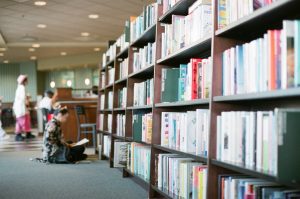
It’s no secret that the humanities play an important role in society and in our lives, but to Linda Garrison ’21PhD, a graduate of the Texts and Technology program, it goes much deeper than that. For her dissertation, she looked into whether elementary school libraries in west-central Florida provide diverse, inclusive collections of LGBTQIA+ material, and she came to a significant conclusion: humanities research can save lives.
Garrison was inspired to research the issue of LGBTQIA+ materials in libraries by her own work as a librarian, as well as her family members who identify as members of the community. She noticed that not many researchers were examining the issue — especially not at the elementary school level that she chose to focus on.
“I consider my work to be a feminist research project as the focus is giving voice to a marginalized community and my ultimate goal is to support social justice and social change,” Garrison wrote in her dissertation. “It is my hope that this study helps every librarian be bold and unafraid as we support our LGBTQIA+ students.”
As a librarian, Garrison is familiar with the importance of the library as a safe place of learning for children and adults alike. Even within libraries that do provide LGBTQIA+ materials, she noticed a difference in where the books were featured on the shelves.
“Classification is one of the first things you learn in school,” says Garrison. “The library shelves make classification very visible. ‘Why isn’t my family in the picture book section? Why is my family in the parent/teacher collection? What makes me different?'”

By conducting anonymous surveys and interviews with librarians, Garrison uncovered three critical factors that play a role in whether LGBTQIA+ materials are included in school libraries: whether librarians believe that the materials belong there, whether they have administrative support and whether they have support from parents.
“And, of course, you need the budget,” Garrison adds. “One librarian said, ‘If I had a million dollars, I could not buy enough books.'”
In addition to surveying and interviewing librarians, Garrison spoke to the parents of transgender children, including the mother of Jazz Jennings, a YouTube and television personality and LGBT rights activist. Jennings’ story is featured in the autobiographical children’s book I Am Jazz. The book has been challenged by some for exploring gender identity, leading to its inclusion on the American Library Association’s list of the top 10 most challenged and banned books in 2017.
“Just being exposed to images of transgender persons reduces transphobia,” says Garrison. “What better place to provide that than a picture book, like I Am Jazz?”
Looking back at her research, Garrison noted a common theme among the librarians she interviewed: the distinction between pushing an agenda and supporting students by providing them with materials that reflect their lives and experiences.
“We are providing material that allows students to see their lived lives,” says Garrison. “It acknowledges who they are, and that in and of itself can make a difference.”
To learn more about the Texts and Technology Ph.D. program, click here